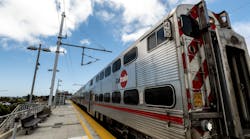CalSTA awards 28 California transit projects $690 million in grants
The California State Transportation Agency (CalSTA) awarded more than $690 million in funding through its Transit and Intercity Rail Capital Program (TIRCP) to 28 state transit projects. Funding for TIRCP is supported by California’s Greenhouse Gas Reduction Fund (GGRF), and the grants will benefit disadvantaged communities by supporting equity, enhance mobility options, improve service and reduce overdependence on driving.
“California is making a multiyear, multibillion-dollar investment to transform and modernize our transportation infrastructure, creating jobs, alternatives to driving and reducing pollution,” said California Gov. Gavin Newsom. “Our state is placing a high priority on investing in public transportation projects that aim to shift away from fossil fuels while making public travel more rider friendly. Today’s announcement not only provides better travel alternatives, but also helps to speed up our transition to a cleaner, healthier transportation future for all Californians.”
Projects receiving funding come from all regions of the state and will result in the purchase of 277 new zero-emission vehicles statewide and the development of several high-priority mobility hubs and rail projects.
The more than $690 million awarded in TIRCP grants will help deliver $2.63 billion in transit projects. This round of funding follows $2.54 billion awarded in January for a total state investment of more than $3.2 billion in public transportation in just the first four months of 2023.
“Building a resilient and sustainable future for all is possible when we coordinate transit and housing investments,” said California Business, Consumer Services and Housing Agency Secretary Lourdes Castro Ramírez. "These funding awards help expand the availability of transit options near housing, especially affordable housing, and provide people the freedom to more easily access jobs, health care, schools and ultimately create greater economic opportunity.”
Highlights of the projects to receive funding
The largest single grant was awarded to North County Transit District (NCTD), in coordination with the San Diego Association of Governments, which received $100 million to deliver the San Dieguito Bridge Replacement, Double Track, and Special Events Platform Project. The funding will support construction of the second phase of the San Dieguito Double Track project. Work will include replacement of the aging wooden trestle San Dieguito Lagoon rail bridge, construction of a special events platform for the Del Mar Fairgrounds, the construction of 0.3 miles of new main track and siding rehabilitation/track improvements to 0.9 miles of siding track to create a total of 1.2 miles of new usable double track.
“Replacement of this 107-year-old bridge is critical to ensuring the region’s transportation network is resilient to the impacts of climate change and rising sea levels,” said NCTD Board Chair Jewel Edson. “Additionally, adding capacity-enhancing double-track in the area and a special events platform will increase NCTD COASTER and Amtrak Pacific Surfliner ridership.”
Santa Clara Valley Transportation Authority (VTA) received $46.59 million for the Eastridge to BART Regional Connector project, which will extend the existing Orange light-rail line by 2.4 miles and create a direct rail link between Eastridge Mall, the authority’s second busiest bus transit center, and Milpitas BART Station. The extension will include an elevated station at Story Road and a street level station at the Eastridge Transit Center. The state grant is the final funding piece needed to move the project forward to construction.
“This extension is long awaited and, thanks to strong community advocacy and input, VTA is gratified to receive the state of California’s support and confidence in VTA’s ability to deliver this game-changing mobility improvement for East San Jose,” said Santa Clara VTA General Manager and CEO Carolyn Gonot.
Santa Cruz Metropolitan Transit District received $38.6 million for its Zero Emission Intercity Transit Service Expansion Project that will see the district purchase 24 hydrogen buses to expand service frequency on Highways 1 and 17. Additionally, the project includes affordable housing construction, including at Pacific Station North in Santa Cruz and the Watsonville Transit Center.
The project will reduce greenhouse gas emissions in the region by helping convert 25 percent of Santa Cruz Metro’s fleet of compressed natural gas and diesel buses to zero-emission hydrogen buses within the next 24 months. The project also includes construction of a hydrogen fueling station that will support the full transition of the district’s 94-bus fleet to zero-emission technology by 2037, with enough capacity to support the zero-emissions fueling needs of local partner agencies and others.
“Thanks to this vitally important funding from the state, [Santa Cruz] Metro can put forward innovative solutions for our community that will improve equitable access to transit, support creation of infill housing with improved transit access and reduce greenhouse gas emissions,” said Santa Cruz Metro Board Chair Shebreh Kalantari-Johnson.
Santa Cruz Metro is also a partner agency with Capitol Corridor Joint Powers Authority (CCJPA) and the cities of Sacramento and Hercules in the Capitol Corridor Emerging Market Access Program, which secured a $30.9 million grant. This includes fully funding the Sacramento Valley Station (SVS) Transit Center multimodal access improvements, expansion of contactless EMV readers to support payments on connecting buses, design of multimodal transit facility Hercules Hub and Sacramento-Roseville Third Track. Together, these projects aim to reduce greenhouse gas emissions by an estimated 161,000 metric tons of CO2 (MTCO2e).
“As the Capitol Corridor services continue to rebound and evolve to meet the traveling public’s needs, it’s our goal to keep the Capitol Corridor accessible, modern and connected to northern California communities,” added CCJPA Managing Director Rob Padgette.
A second CCJPA project to receive funding is the Link21 Megaregional Rail Program, which was awarded $11.3 million. The program plans to transform northern California’s rail network into a faster, more connected system. The funding will be used for the Design and Environment Advancement Phases 1 and 2 of the Link21 program.
“As one of only eight projects statewide awarded funding for project development, this award speaks volumes of the state’s recognition and support for Link21, reaffirming our partnership in development of this critical piece of our future rail network,” said Bob Powers, Capitol Corridor executive director and BART general manager.
TIRCP has provided more than $9.8 billion in funding to 125 projects since 2015. A full list of projects awarded grants can be found at CalSTA’s website.

Mischa Wanek-Libman | Group Editorial Director
Mischa Wanek-Libman is director of communications with Transdev North America. She has more than 20 years of experience working in the transportation industry covering construction projects, engineering challenges, transit and rail operations and best practices.
Wanek-Libman has held top editorial positions at freight rail and public transportation business-to-business publications including as editor-in-chief and editorial director of Mass Transit from 2018-2024. She has been recognized for editorial excellence through her individual work, as well as for collaborative content.
She is an active member of the American Public Transportation Association's Marketing and Communications Committee and served 14 years as a Board Observer on the National Railroad Construction and Maintenance Association (NRC) Board of Directors.
She is a graduate of Drake University in Des Moines, Iowa, where she earned a Bachelor of Arts degree in Journalism and Mass Communication.





